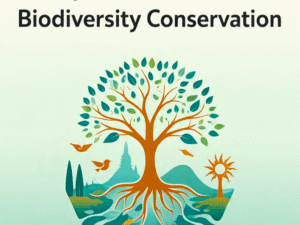Carbon Credit Project Development
- Description
- Curriculum
- FAQ
- Reviews
- Grade
The global push for a low-carbon economy has created a significant demand for high-quality carbon credits. These credits are a key tool for corporations, governments, and individuals seeking to offset their emissions. However, the process of developing a carbon credit project is complex, requiring a blend of technical, financial, and regulatory expertise. This course provides a clear, step-by-step roadmap through the entire project lifecycle, from initial concept to the final sale of credits. The program is designed to bridge the gap between theoretical knowledge and practical application, empowering you to become a key player in the growing climate finance market.
This course is designed for professionals and organizations seeking to develop, finance, and manage carbon credit projects that meet the highest standards of integrity. It goes beyond a theoretical overview to provide a pragmatic, expert-level understanding of the entire project lifecycle, from initial concept to credit issuance. The curriculum is built to address the critical challenges of the modern carbon market, including regulatory uncertainty, integrity crises, and the rapid pace of technological innovation. Participants will learn how to navigate complex market dynamics, apply leading crediting standards, and use real-world case studies to develop a strategic, risk-aware mindset.
Course Objectives
-
To develop a foundational understanding of carbon markets, including the difference between voluntary and compliance markets and the role of registries and standards.
-
To master the technical skills required to design a credible and certifiable carbon project, including baseline setting, additionality, and leakage analysis.
-
To acquire the financial and strategic knowledge necessary to model project viability, identify and mitigate risks, and engage with diverse stakeholders.
-
To produce a comprehensive, professional-grade carbon project proposal that can serve as a portfolio piece for career advancement or a blueprint for a real-world project.
Learning Outcomes
Upon completion of this course, you will be able to:
-
Analyze the structure and function of global carbon markets and explain the significance of high-quality credits.
-
Formulate a robust Project Design Document (PDD), applying the core principles of additionality and methodology to a real or hypothetical project.
-
Evaluate the financial viability of a carbon project and create a plan to manage potential technical, political, and financial risks.
-
Calculate, value, and strategize for the sale of carbon credits, identifying suitable markets and sales channels for your project.
What You Will Learn
-
The origins and evolution of carbon markets.
-
How to choose the right methodology for your project.
-
The three tests for proving additionality.
-
How to calculate your project’s emissions reductions.
-
Strategies for effective stakeholder engagement and risk mitigation.
-
How to valuate your carbon credits based on project type and co-benefits.
-
The ins and outs of both voluntary and compliance carbon markets.
-
A practical, hands-on approach to developing a complete project proposal from start to finish.
-
11.1: Foundations of Carbon Markets40 mins
Welcome to the very beginning of your journey! In this first lesson, we'll dive into the fundamental concepts of carbon credits. You'll learn why this market-based solution is so crucial for tackling climate change and what a carbon credit actually is. We’ll also introduce the key players - from project developers like you to the independent verifiers - that make the entire system work, giving you a solid foundation for everything that's to come.
-
21.2: Navigating the Carbon Market Landscape20 minsSorry, this lesson is currently locked. You need to complete "1.1: Foundations of Carbon Markets" before accessing it.
Now that you understand the "what," let's explore the "where." This lesson will guide you through the two main types of carbon markets: the mandatory Compliance Market and the flexible Voluntary Market, where you'll focus your efforts. You’ll also learn about the major registries and standards that ensure project integrity, so you can confidently choose the right path for your future projects.
-
31.3: Understanding Project TypesText lesson
With a solid grasp of the market, it’s time to find your place in it. This lesson will introduce you to the diverse world of carbon project types, from renewable energy to forestry and waste management. We’ll explore different examples and walk through a simple project screening exercise, preparing you to identify and assess potential opportunities for your very own carbon project.
-
4Knowledge Checkpoint - Carbon Credit Project Development M1QuizSorry, this lesson is currently locked. You need to complete "1.1: Foundations of Carbon Markets" before accessing it.
-
52.1: Identifying and Screening Opportunities40 mins
Your journey to becoming a successful project developer begins with a single, crucial step: finding a great idea. In this lesson, we'll teach you how to identify potential carbon projects and use your Project Screening Worksheet to quickly assess their viability. By the end, you'll be able to sift through many opportunities to find the one with the best chance of success.
-
62.2: Financial Modeling for Carbon Projects43 minsSorry, this lesson is currently locked. You need to complete "2.1: Identifying and Screening Opportunities" before accessing it.
This lesson will walk you through the structured, multi-stage journey of developing a carbon project, from the initial concept to the final issuance of credits. Understanding this process is key to managing a project's timeline and ensuring its success.
-
72.3: Securing Project Financing39 minsSorry, this lesson is currently locked. You need to complete "2.1: Identifying and Screening Opportunities" before accessing it.
In this lesson, you will discover why a high-integrity project is about more than just carbon. You'll learn to embed social and environmental co-benefits into your project design and master the art of stakeholder engagement to build trust and long-term value.
-
8Knowledge Checkpoint - Carbon Credit Project Development M2QuizSorry, this lesson is currently locked. You need to complete "2.1: Identifying and Screening Opportunities" before accessing it.
-
93.1: Choosing the Right Methodology21 mins
In this lesson, you will explore the key differences between the two leading crediting standards, Verra and Gold Standard. Understanding their distinct approaches will help you make a strategic decision that aligns with your project's goals and target market.
-
103.2: Mastering Additionality30 minsSorry, this lesson is currently locked. You need to complete "3.1: Choosing the Right Methodology" before accessing it.
In this lesson, you will learn about the new benchmark for quality in the voluntary carbon market. The Integrity Council for the Voluntary Carbon Market (ICVCM) and its Core Carbon Principles (CCPs) are a direct response to the market's integrity crisis and are becoming essential for any developer seeking to produce a credible credit.
-
113.3: Baseline Setting and Leakage31 minsSorry, this lesson is currently locked. You need to complete "3.1: Choosing the Right Methodology" before accessing it.
In this lesson, you will learn from the market's biggest mistakes. By deconstructing real-world examples of controversial projects, you will learn to identify the common failings that undermine a credit's integrity and value.
-
12Knowledge Checkpoint - Carbon Credit Project Development M3QuizSorry, this lesson is currently locked. You need to complete "3.1: Choosing the Right Methodology" before accessing it.
-
133.4: The Carbon Credit CalculationText lesson
-
144.1: The Project Design Document (PDD)30 mins
In this lesson, you will learn about the strategic shift from carbon avoidance to carbon removal. You will understand why carbon removal is becoming a crucial component of global climate strategy and gain an overview of the key engineered technologies driving this change.
-
154.2: Data Management and Monitoring31 minsSorry, this lesson is currently locked. You need to complete "4.1: The Project Design Document (PDD)" before accessing it.
In this lesson, you will learn how technology is addressing one of the market's biggest challenges: the manual, time-consuming, and error-prone process of measuring emissions. You will explore how Digital MRV (D-MRV) provides a transformative solution, bringing accuracy and transparency to carbon projects.
-
164.3: Stakeholder Engagement and Co-Benefits43 minsSorry, this lesson is currently locked. You need to complete "4.1: The Project Design Document (PDD)" before accessing it.
In this lesson, you will learn how blockchain technology can provide a secure and transparent solution to one of the biggest problems in the carbon market: double-counting and fraud. You will understand how tokenization can enhance the value of your credits while also learning to identify the risks of poorly implemented initiatives.
-
17Knowledge Checkpoint - Carbon Credit Project Development M4QuizSorry, this lesson is currently locked. You need to complete "4.1: The Project Design Document (PDD)" before accessing it.
-
185.1: The Validation and Verification Process20 mins
In this lesson, you will gain a deep understanding of Article 6 of the Paris Agreement. This framework is not just international policy; it is the future of global carbon trading and a core driver of market growth. You will learn its key mechanisms and their direct impact on your projects.
-
195.2: Audits and Corrective Actions20 minsSorry, this lesson is currently locked. You need to complete "5.1: The Validation and Verification Process" before accessing it.
In this lesson, you will learn that the carbon market is not only shaped by international agreements but also by a complex patchwork of national and local laws. You will contrast the U.S. government’s high-level principles with California's legally binding disclosure laws to understand the importance of compliance and transparency.
-
205.3: Navigating Project Risks31 minsSorry, this lesson is currently locked. You need to complete "5.1: The Validation and Verification Process" before accessing it.
In our final lesson, you will explore the financial side of the carbon market. You will learn to frame carbon credits not as a cost of doing business but as a strategic financial asset that can attract investment, enhance brand reputation, and improve access to capital.
-
21Knowledge Checkpoint - Carbon Credit Project Development M5QuizSorry, this lesson is currently locked. You need to complete "5.1: The Validation and Verification Process" before accessing it.

This is a self-paced online course, providing flexibility for working professionals.
-
Platform Access: A stable internet connection is required to access the dedicated online learning platform.
-
Time Commitment: The course is designed to be completed at your own pace. A typical learner might spend 16 to 20 hours on the course materials and exercises.
-
Assessment: Learning will be assessed through a combination of quizzes, assignments, and a final capstone project.
-
Certification: A Certificate of Proficiency will be awarded upon successful completion of the course and a passing grade of 80% or higher on the quizzes and final project.
This course is designed for professionals and organizations interested in developing and investing in carbon credit projects, including:
- Sustainability Professionals.
-
Environmental Consultants.
-
Project Developers.
-
Investors and Financial Analysts.
-
NGOs and Community Organizations.
About This Site
Home to business, personal and career resources. Get the assistance you need for continuous business and professional development!











